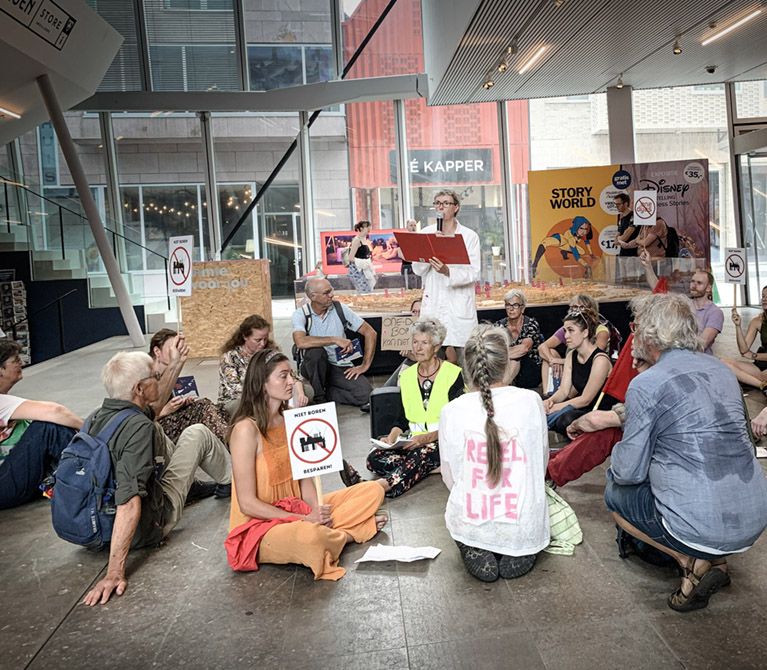
UG doesn’t have many climate rebels
Scientist / Activist
They kind of looked like a women’s choir, the group of protesters that walked into the Forum in Groningen while singing on August 19. To the tune of the well-known Italian protest song ‘Bella Ciao’, they began their protest against new plans to drill for gas near the island of Schiermonnikoog.
Several protesters had already hung banners in the building before the protest started.
After approximately twenty minutes, the group, consisting of roughly sixty people, left the building again, starting a march through town accompanied by drums.
The protest was organised by Scientist Rebellion (SR), Extinction Rebellion (XR), and the Dutch arm of the Fossil Free movement. However, no Groningen scientists took part in this protest. SR was founded nearly a year ago. Are there no academic climate activists in Groningen? Perhaps they were still on holiday. Or maybe protesting just isn’t in our Northern nature?
Randstad
‘I didn’t go, either’, says Isa. The young scientist, currently working on her thesis at the UG, is one of SR’s few active members. She wasn’t in town on the day of the protest, and she doesn’t know anyone else who attended.
‘I’m not sure why no one from Groningen was there, but usually, it’s difficult for people here to join in, since most of the Scientist Rebellion campaigns take place in the Randstad’, she says. Busy Groningen scientists can’t just ‘pop over’.
If you say something on your own, people look at you differently
It’s much easier for scientists from cities such as Amsterdam, Utrecht, or Wageningen to travel to another city. ‘That’s why there’s such a strong network in the Randstad’, says Isa. This network means organising events can be divided across groups and more people can be mobilised at once.
She also knows that there’s a tough core group of fanatics in the western part of the country. ‘Wageningen, for instance, has a large environmental research department, which means they have more climate scientists. They do these marathon readings of the IPCC report, where they read the entire climate report in public to raise awareness of it.’
Groningen scientists aren’t necessarily keen to participate in campaigns like these.
Reticent
‘I’m usually someone who does join protests’, says UG biologist Maria van Leeuwe (58). ‘I also think it’s important to protest, but I want to do so under my own name. I think people in Groningen might be a bit reticent to protest as scientists’, she says.
She agrees that protests are easier in the Randstad. ‘Travelling to a city in a large group makes you feel safer. But here in Groningen, if you say something on your own, people look at you differently.
You can’t convince people who aren’t interested in hearing it
Van Leeuwe isn’t the only one who prefers to protest under her own name. ‘I wonder if it’s a good idea for scientists to be on the barricades, because I’m not sure what good it’ll do’, says Jacqeline Stefels (64). She, too, is a biologist at the UG, and has seen how climate change increasingly impacts nature her entire professional life.

‘It’s not like I disagree with the goals these groups like Scientist Rebellion and Extinction Rebellion have, but at a certain point you have to wonder if they’re not going too far’, says Stefels. She might be referring to XR blocking the A12, a campaign that started in September. XR ended the campaign after twenty-seven days and is now waiting for the Lower House to vote on a plan to reduce fossil fuel subsidies.
She’s torn, she says: she’s convinced that something should be done, but this kind of civil disobedience just makes people upset. ‘I get that a group of professors in gowns on the A12 would be a powerful image, but I wonder who the intended audience would be. You can’t convince people who aren’t interested in hearing it.’
Muddling the message
When scientists do become activists, they run the risk of muddling the message they want their research to propagate. ‘I admire all those young people for being on the A12 the past few weeks and for the way they’re trying to make people aware of the issue again’, says polar researcher Maarten Loonen. ‘But should I be blocking the road in an effort to get my message across? I’m not so sure about that.’
I’m worried my own narrative would start lacking nuance
Will people pay more attention to me if I’m more extreme in my views? Should I be more radical in the way I express my concerns? These are questions which Loonen currently answers in the negative. ‘They did ask me if I wanted to join them’, he says. ‘But I worry that my own narrative would start lacking in nuance if I became part of the group.’
His narrative, which is that the weather and circumstances at Svalbard are changing too rapidly, is something people are directly experiencing. ‘During my lectures, I used to tell people how their grandchildren would suffer the effects of climate change. In the meantime, reality has overtaken any models we had, and it’s the attendees themselves who are affected by global warming.’
Dilemma
Young Isa is also struggling with the dilemma; to what extent are science and activism compatible? For instance: Isa is not her real name. She’d rather not use it, to prevent activism from being – further – conflated with her research.
‘It’s a whole process’, she says. ‘I keep asking myself how I’d like to be known, and what side I should be on. Am I an activist first and a scientist second? Or is it the other way around? Isn’t being an academic already activist?’
At the same time, people participating in her research can easily google her. ‘I’d rather the results show my work, which is indirectly related to climate research, than my activism.’
Behind the scenes
However, this hasn’t stopped Isa from taking action. Even though the SR Groningen contingent isn’t especially large, consisting of around twenty people, and doesn’t go out to protest all that often, they’re working hard behind the scenes: SR Groningen is participating in the national Mapping Fossil Ties Coalition.
‘That’s a project in which we try to figure out the connection between Dutch universities and the fossil fuel industry’, says Isa. ‘I was able to use my skills to write a request to the UG as part of the Open Government Act. These are projects that will take a long time; we’ve been working on them for nearly a year now. We won’t go public until we have the results, but that doesn’t make what we do any less relevant than other forms of protesting.’